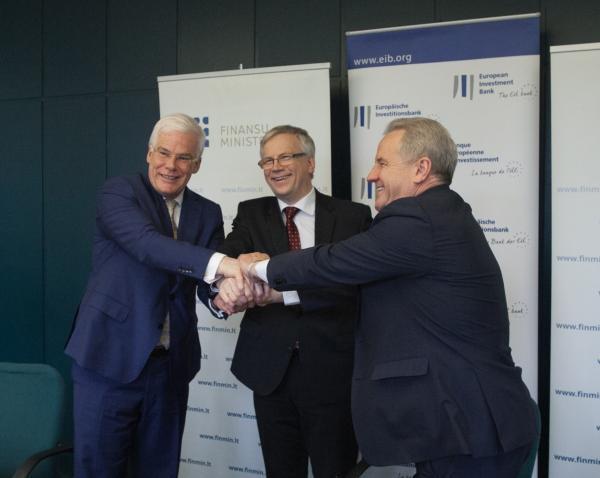
Lithuania and European Investment Bank (EIB) continue their strong partnership by establishing the EUR 150 million “Jessica II” fund and signing an agreement on a EUR 1,3 billion loan facility.
The “Jessica II” fund will continue the support for energy efficiency investments in Lithuania to cut energy bills in hundreds of Lithuanian multi-apartment buildings. The agreement was signed by Pim van Ballekom, EIB Vice-President, Rimantas Šadžius, Minister of Finance and Kęstutis Trečiokas, Minister of Environment.
The EUR 300 million loan for Lithuania, signed today by Minister Šadžius and the EIB Vice-President van Ballekom, will support investment in the areas of communications, energy, sustainable transport infrastructure and rural development. It is the first tranche of a larger facility, totalling up to EUR 1,3 billion.
Pim van Ballekom, EIB Vice-President responsible for lending in Lithuania, said: “Both agreements signed today show the EIB's commitment to supporting Lithuania on its path to growth. The “Jessica II” fund will help to create new jobs and lower CO2 emissions, meanwhile allowing thousands of people to refurbish their houses and cut energy bills. The framework loan will help strengthen the competitiveness of the Lithuanian economy in many sectors, including communications, transport and rural development. Together these projects make an important contribution towards sustainable economic growth and a better quality of life for the Lithuanian people.”
Finance Minister Rimantas Šadžius added: “Financial instruments like the JESSICA fund allow us to achieve a multiplier effect on public funds by attracting private resources, which leads to better results and a greater impact on the economy. Having a limited amount of public funds and a much bigger package of demands for investments, leverage of private sources is a great possibility to increase the scope of public interventions. Lithuania and the EIB have developed sound mutual co-operation with regard to the management of the EIB loan for Lithuania in 2007–2013 and will continue this co-operation in the new 2014–2020 European Structural and Investment Funds programming period.”
Minister of Environment Kęstutis Trečiokas said: “I am pleased with the constancy of renovation which is clearly visible during last two years. 7000 people are now happier with their lower bills for heating and better living conditions. Not to forget, energy savings through the renovation of the existing building stock is one of the most attractive and low cost options to reduce the emissions of CO2 and potentially improve energy security by reducing imports of fossil fuels. In addition to the permanent benefits these renovations may bring, it will also produce a much needed stimulus to the Lithuanian economy.”
JESSICA II agreement
Through the deal signed today, the EIB will become the Fund Manager of the “Jessica II” Fund. With this, some EUR 150 million from the 2014-2020 EU Structural and Investment Funds will be made available to the Lithuanian government's “Multi-apartment Building Modernisation Programme” - a key Government priority with national and municipal support, and international recognition. This is a follow-up fund of the JESSICA Holding Fund Lithuania (JESSICA I) - of which all funds have already been committed - and the EIB's first mandate for managing decentralised financial instruments for the 2014-2020 Programming Period. Based on JESSICA I's success, this will enable the energy efficiency modernisation of residential buildings across Lithuania through preferential loans. Up to now, up to 250 buildings have finished the refurbishment and around 1,000 buildings are currently undergoing works.
Co-financing loan
The EUR 300m loan signed today is the first tranche of the EUR 1.3 billion facility and will be available as co-financing for selected projects under Lithuanian operational programmes for 2014–2020. The EU Structural Funds will meet a fixed percentage of the costs of eligible projects, with the remaining part being covered from the State budget or by drawing on the EIB facility. The loan will primarily support projects in the research, education and IT sectors, with financing also going to Lithuanian SMEs, climate change mitigation projects and employment programmes. More specifically, three larger projects have also been earmarked for funding: the construction of the Vilnius Western Bypass and the modernisation of the centralised heating sector in the cities of Vilnius and Kaunas. Additionally, the funds granted by the EIB loan may be on-lent to municipalities as well as enterprises of which the state or a municipality is owner or shareholder. They may use the loan to co-fund the projects implemented from EU structural assistance. The Lithuanian Ministry of Finance will announce details on on-lending procedures once the first tranche is disbursed.

Photographer: EIB ©To be defined
Download original

Photographer: EIB ©To be defined
Download original

Photographer: EIB ©To be defined
Download original

Photographer: EIB ©To be defined
Download original

Photographer: EIB ©To be defined
Download original

Photographer: EIB ©To be defined
Download original

Photographer: EIB ©To be defined
Download original

Photographer: EIB ©To be defined
Download original

Photographer: EIB ©To be defined
Download original

Photographer: EIB ©To be defined
Download original